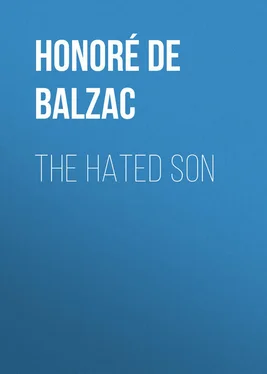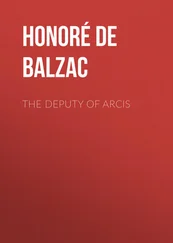Honoré Balzac - The Hated Son
Здесь есть возможность читать онлайн «Honoré Balzac - The Hated Son» — ознакомительный отрывок электронной книги совершенно бесплатно, а после прочтения отрывка купить полную версию. В некоторых случаях можно слушать аудио, скачать через торрент в формате fb2 и присутствует краткое содержание. Жанр: literature_19, foreign_antique, foreign_prose, на английском языке. Описание произведения, (предисловие) а так же отзывы посетителей доступны на портале библиотеки ЛибКат.
- Название:The Hated Son
- Автор:
- Жанр:
- Год:неизвестен
- ISBN:нет данных
- Рейтинг книги:5 / 5. Голосов: 1
-
Избранное:Добавить в избранное
- Отзывы:
-
Ваша оценка:
- 100
- 1
- 2
- 3
- 4
- 5
The Hated Son: краткое содержание, описание и аннотация
Предлагаем к чтению аннотацию, описание, краткое содержание или предисловие (зависит от того, что написал сам автор книги «The Hated Son»). Если вы не нашли необходимую информацию о книге — напишите в комментариях, мы постараемся отыскать её.
The Hated Son — читать онлайн ознакомительный отрывок
Ниже представлен текст книги, разбитый по страницам. Система сохранения места последней прочитанной страницы, позволяет с удобством читать онлайн бесплатно книгу «The Hated Son», без необходимости каждый раз заново искать на чём Вы остановились. Поставьте закладку, и сможете в любой момент перейти на страницу, на которой закончили чтение.
Интервал:
Закладка:
“Try to suffer patiently,” he said to her. “I will founder my horse if necessary to bring you speedy relief.”
These words were certainly not alarming, and the countess, emboldened by them, was about to make a request when the count asked her suddenly: —
“Tell me where you keep your masks?”
“My masks!” she replied. “Good God! what do you want to do with them?”
“Where are they?” he repeated, with his usual violence.
“In the chest,” she said.
She shuddered when she saw her husband select from among her masks a “touret de nez,” the wearing of which was as common among the ladies of that time as the wearing of gloves in our day. The count became entirely unrecognizable after he had put on an old gray felt hat with a broken cock’s feather on his head. He girded round his loins a broad leathern belt, in which he stuck a dagger, which he did not wear habitually. These miserable garments gave him so terrifying an air and he approached the bed with so strange a motion that the countess thought her last hour had come.
“Ah! don’t kill us!” she cried, “leave me my child, and I will love you well.”
“You must feel yourself very guilty to offer as the ransom of your faults the love you owe me.”
The count’s voice was lugubrious and the bitter words were enforced by a look which fell like lead upon the countess.
“My God!” she cried sorrowfully, “can innocence be fatal?”
“Your death is not in question,” said her master, coming out of a sort of reverie into which he had fallen. “You are to do exactly, and for love of me, what I shall now tell you.”
He flung upon the bed one of the two masks he had taken from the chest, and smiled with derision as he saw the gesture of involuntary fear which the slight shock of the black velvet wrung from his wife.
“You will give me a puny child!” he cried. “Wear that mask on your face when I return. I’ll have no barber-surgeon boast that he has seen the Comtesse d’Herouville.”
“A man! – why choose a man for the purpose?” she said in a feeble voice.
“Ho! ho! my lady, am I not master here?” replied the count.
“What matters one horror the more!” murmured the countess; but her master had disappeared, and the exclamation did her no injury.
Presently, in a brief lull of the storm, the countess heard the gallop of two horses which seemed to fly across the sandy dunes by which the castle was surrounded. The sound was quickly lost in that of the waves. Soon she felt herself a prisoner in the vast apartment, alone in the midst of a night both silent and threatening, and without succor against an evil she saw approaching her with rapid strides. In vain she sought for some stratagem by which to save that child conceived in tears, already her consolation, the spring of all her thoughts, the future of her affections, her one frail hope.
Sustained by maternal courage, she took the horn with which her husband summoned his men, and, opening a window, blew through the brass tube feeble notes that died away upon the vast expanse of water, like a bubble blown into the air by a child. She felt the uselessness of that moan unheard of men, and turned to hasten through the apartments, hoping that all the issues were not closed upon her. Reaching the library she sought in vain for some secret passage; then, passing between the long rows of books, she reached a window which looked upon the courtyard. Again she sounded the horn, but without success against the voice of the hurricane.
In her helplessness she thought of trusting herself to one of the women, – all creatures of her husband, – when, passing into her oratory, she found that the count had locked the only door that led to their apartments. This was a horrible discovery. Such precautions taken to isolate her showed a desire to proceed without witnesses to some horrible execution. As moment after moment she lost hope, the pangs of childbirth grew stronger and keener. A presentiment of murder, joined to the fatigue of her efforts, overcame her last remaining strength. She was like a shipwrecked man who sinks, borne under by one last wave less furious than others he has vanquished. The bewildering pangs of her condition kept her from knowing the lapse of time. At the moment when she felt that, alone, without help, she was about to give birth to her child, and to all her other terrors was added that of the accidents to which her ignorance exposed her, the count appeared, without a sound that let her know of his arrival. The man was there, like a demon claiming at the close of a compact the soul that was sold to him. He muttered angrily at finding his wife’s face uncovered; then after masking her carefully, he took her in his arms and laid her on the bed in her chamber.
CHAPTER II. THE BONESETTER
The terror of that apparition and hasty removal stopped for a moment the physical sufferings of the countess, and so enabled her to cast a furtive glance at the actors in this mysterious scene. She did not recognize Bertrand, who was there disguised and masked as carefully as his master. After lighting in haste some candles, the light of which mingled with the first rays of the sun which were reddening the window panes, the old servitor had gone to the embrasure of a window and stood leaning against a corner of it. There, with his face towards the wall, he seemed to be estimating its thickness, keeping his body in such absolute immobility that he might have been taken for a statue. In the middle of the room the countess beheld a short, stout man, apparently out of breath and stupefied, whose eyes were blindfolded and his features so distorted with terror that it was impossible to guess at their natural expression.
“God’s death! you scamp,” said the count, giving him back his eyesight by a rough movement which threw upon the man’s neck the bandage that had been upon his eyes. “I warn you not to look at anything but the wretched woman on whom you are now to exercise your skill; if you do, I’ll fling you into the river that flows beneath those windows, with a collar round your neck weighing a hundred pounds!”
With that, he pulled down upon the breast of his stupefied hearer the cravat with which his eyes had been bandaged.
“Examine first if this can be a miscarriage,” he continued; “in which case your life will answer to me for the mother’s; but, if the child is living, you are to bring it to me.”
So saying, the count seized the poor operator by the body and placed him before the countess, then he went himself to the depths of a bay-window and began to drum with his fingers upon the panes, casting glances alternately on his serving-man, on the bed, and at the ocean, as if he were pledging to the expected child a cradle in the waves.
The man whom, with outrageous violence, the count and Bertrand had snatched from his bed and fastened to the crupper of the latter’s horse, was a personage whose individuality may serve to characterize the period, – a man, moreover, whose influence was destined to make itself felt in the house of Herouville.
Never in any age were the nobles so little informed as to natural science, and never was judicial astrology held in greater honor; for at no period in history was there a greater general desire to know the future. This ignorance and this curiosity had led to the utmost confusion in human knowledge; all things were still mere personal experience; the nomenclatures of theory did not exist; printing was done at enormous cost; scientific communication had little or no facility; the Church persecuted science and all research which was based on the analysis of natural phenomena. Persecution begat mystery. So, to the people as well as to the nobles, physician and alchemist, mathematician and astronomer, astrologer and necromancer were six attributes, all meeting in the single person of the physician. In those days a superior physician was supposed to be cultivating magic; while curing his patient he was drawing their horoscopes. Princes protected the men of genius who were willing to reveal the future; they lodged them in their palaces and pensioned them. The famous Cornelius Agrippa, who came to France to become the physician of Henri II., would not consent, as Nostradamus did, to predict the future, and for this reason he was dismissed by Catherine de’ Medici, who replaced him with Cosmo Ruggiero. The men of science, who were superior to their times, were therefore seldom appreciated; they simply inspired an ignorant fear of occult sciences and their results.
Читать дальшеИнтервал:
Закладка:
Похожие книги на «The Hated Son»
Представляем Вашему вниманию похожие книги на «The Hated Son» списком для выбора. Мы отобрали схожую по названию и смыслу литературу в надежде предоставить читателям больше вариантов отыскать новые, интересные, ещё непрочитанные произведения.
Обсуждение, отзывы о книге «The Hated Son» и просто собственные мнения читателей. Оставьте ваши комментарии, напишите, что Вы думаете о произведении, его смысле или главных героях. Укажите что конкретно понравилось, а что нет, и почему Вы так считаете.












